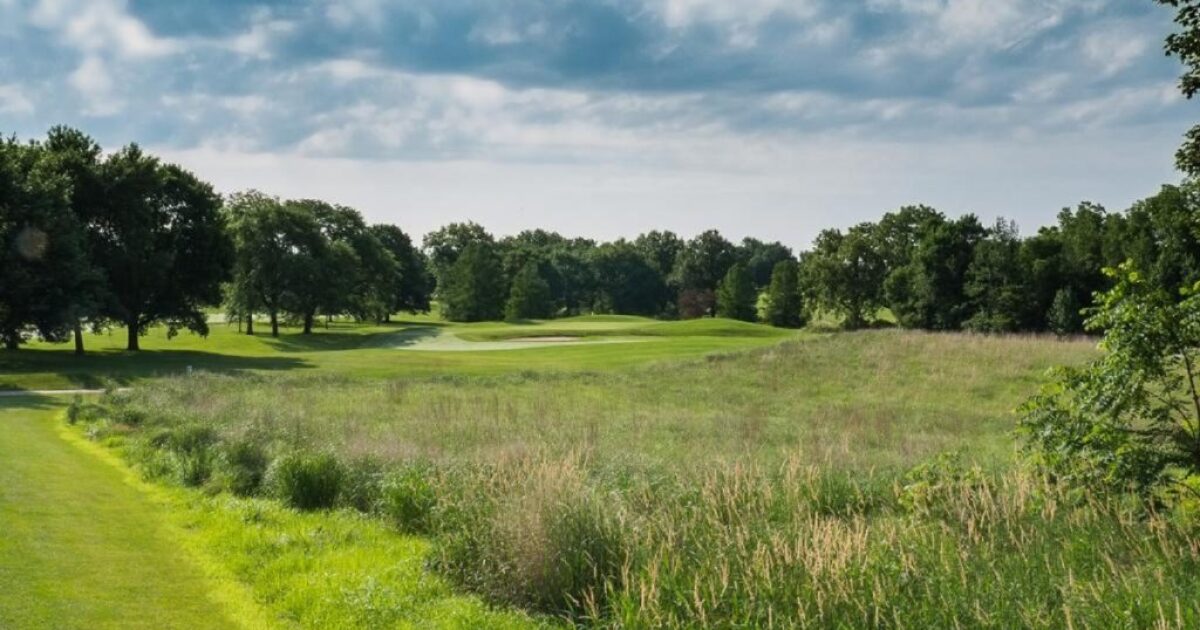Finkbine Golf Course, home of the University of Iowa men’s and women’s golf teams, is preparing for a comprehensive transformation led by course architect Scott Hoffman. The scope of the renovation marks the most notable change to Finkbine since the course relocated in the early 1950s.
Construction is set to begin at the conclusion of the 2025 golf season and will continue throughout 2026. The project will focus on modernizing the layout, improving playability and incorporating sustainable turf technologies aimed at reducing water usage and maintenance costs. The privately funded project will be managed by Troon as part of its agreement with the Iowa Athletics Department.
Building on the support of the Nagle Family Clubhouse at Finkbine Golf Course, Fritz and Mary Lee Duda, of Dallas, Texas, have provided the financial support to fund the major renovation.
Hole No. 8, Finkbine Golf Course, Iowa City, Iowa.
(Photo: Troon)
“I take great pride in my family’s roots in Iowa City,” Mary Lee Duda said. “This is a wonderful way to give back to a community and university that has meant so much to my family. Upon completion, the Iowa City community will enjoy access to one of the premier golf courses in the Midwest.”
Finkbine’s roots date to 1924, when William Orlando and Edward Charles Finkbine donated 175 acres of farmland to the University of Iowa as a tribute to their father, Robert Finkbine. The original 18-hole course, designed by renowned golf architect Tom Bendelow, was commonly known as The Golf Course or Westside Field before receiving the official name of Finkbine Field in 1925.
Following World War II, a housing shortage and the need for new university facilities led to a reconfiguration of the golf course at Finkbine Field. In the early 1950s, the university purchased 270 acres with athletic funds and Finkbine Field relocated to its present-day location. Architect Robert Bruce Harris was selected to design the new Finkbine Golf Course. The current 18-hole, par-72 layout opened in July 1955.
Over the decades, Finkbine has hosted numerous prestigious events, including Big Ten Championships, the Ben Hogan Tour and the famed Amana VIP Pro-Am in the 1970s and 1980s. The Nagle Family Clubhouse, a 19,000-square-foot facility that significantly enhanced the venue’s amenities, opened in 2020.
Hoffman will reimagine Finkbine Field. A Nebraska native, Hoffman spent 13 years as a senior design associate for architect Tom Fazio. While with Fazio, Hoffman contributed to dozens of high-profile courses, including Gozzer Ranch, Martis Camp and Pronghorn. After his time with Fazio, Hoffman worked alongside Jackson Kahn Design on several elite projects, including Monterey Peninsula Country Club’s Dunes and Scottsdale National.
Hoffman’s first two solo projects have elevated him as one of the most exciting names in the golf industry. Hoffman’s debut project, Lost Rail Golf Club, located in Omaha, Nebraska, received national acclaim. Another project, Mapleton Golf Club, opened in late summer 2025 in Sioux Falls, South Dakota.
“I feel privileged to be awarded the task of reimagining Finkbine,” Hoffman said. “The goal is to maximize the potential of the course and improve sustainability. We will work with the land, highlighting the most dramatic features, while adding variety, to create the best 18-hole golf course imaginable. We have constructed a plan that will rival the best college courses in the country. The new layout will test the best collegiate players while maintaining playability and enjoyment for golfers of all skill levels.”
AN AMBUSH IN THE MAKING
Park City, Utah’s Marcella Club has retained King Collins Dormer (KCD) to design a new championship course, to be called Ambush. The course will sit atop the ridgelines above the Heber Valley and will join Skyline, a Tiger Woods / TGR Design course currently under construction.
“The site upon which Ambush will be built is one of the most diverse, dramatic and beautiful locations for a golf course we’ve ever seen,” said Rob Collins, partner at KCD. “There are multiple sections of the property, each with their own character. The meandering ridge, which marks the start and finish to the round, is populated by a string of cliff-edge holes with panoramic views, while the middle of the round is characterized by a sublime set of natural golf holes that are nestled into an Aspen-lined valley.”
Jared Lucero, CEO of REEF and developer of Marcella at Deer Valley, said that selecting KCD reflects the group’s ambition to build something truly remarkable.
“Their courses deliver the kind of magic that makes people fall in love with the game all over again,” he said. “Ambush will be no exception — it’s going to be a place where people remember every round.”
The two courses, plus a planned short course from TGR Design, will be exclusive to Marcella members. Marcella features three locations: Marcella at Deer Valley, site of the TGR Design and KCD courses; Marcella at Jordanelle Ridge; and Marcella on Main, located in Old Town in Park City.
Marcella is a collaboration between REEF Capital Partners, which also developed Utah’s Black Desert Resort near St. George, Raintree Investment Corporation and Crosslake Partners. With the purchase of real estate at any of Marcella’s three properties, buyers gain access to all three locations, which also feature ski amenities.
“Ambush provides a second flagship course with its own personality, identity and edge,” said Cody Winterton, division president of Raintree Investment Corporation and developer of Marcella of Jordanelle Ridge. “Together, these courses form the core of something truly rare — a complete high-altitude golf and lifestyle community built for generations. With the help of KCD, we are prioritizing thoughtful land planning, conservation and open space preservation as part of our commitment to environmental stewardship.”
THE SOCIAL ASPECT
Delighted to announce that Parkstone GC have appointed Clyde Johnson @CunninGolf as our consulting architect. Clyde has an impeccable portfolio of past projects. His bespoke design build approach will help maintain Parkstone’s reputation as one the premier healthland golf clubs. pic.twitter.com/1fWCspUDX5
— Grant Peters (@grnkeepergrant) September 19, 2025
AN ISLAND REOPENS FOR PLAY
The Singapore Island Country Club has reopened its Island course following a comprehensive renovation by the firm of Nelson & Haworth.
The redeveloped layout embraces world-class design, eco-conscious technologies and tournament-ready infrastructure, setting a new benchmark for golf in Singapore.
The Island course, one of three championship layouts at the prestigious club, was designed in 1932 by Peter Robinson, a professional from Braid Hills Golf Club in Edinburgh, Scotland. In 1998, Aussie legend Peter Thomson modified the course, including adding bunkers. The Island was a prominent host to the Singapore Open between 1961 and 2000.
By 2021, with advancements in technology, evolving member expectations and an increased focus on sustainability, the need for a comprehensive remodeling became clear. The guiding vision was to preserve heritage while future-proofing the course, integrating safety, playability, and ecological innovation.
Nelson & Haworth were charged with honoring the course’s historic design DNA by introducing advanced turf and drainage systems for year-round play, enhancing inclusivity with multiple tee options for all golfers, and embedding sustainability at the core of design and operations.
“We set out to honor the soul of the Island Course, its history, its natural beauty, its place in the hearts of members while reimagining it for the demands of modern play,” said Ivan Chua, chair of the Island Golf Redevelopment Project Committee. “This redevelopment, one of the club’s most significant infrastructure projects in recent years, is an investment in the future of both the club and the sport. Members can now look forward to more strategic play, better greens and improved bunkers.
General manager Ian Roberts noted that sustainability was a critical factor in the renovation.
“We integrated responsible practices such as water conservation, biodiversity protection and tree preservation, while creating a wetland,” he said. “We have also preserved tree corridors, tagged heritage trees and replanted endangered species. Beyond playability, our commitment is to ensure the course remains environmentally sustainable, with continuous improvements as new systems and innovations emerge.”
For architect Neil Haworth, who succumbed to cancer in June 2024, Singapore Island was a special project. During his years living in Singapore, Haworth was a member of SICC, spending many hours walking, studying and playing the Island Course. His knowledge of the land gave him a one-of-a-kind perspective on his redesign.







